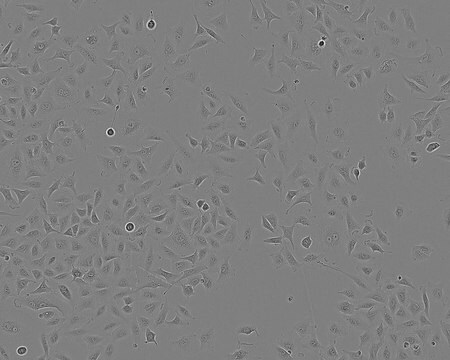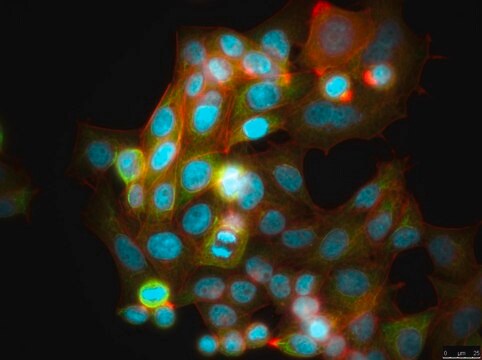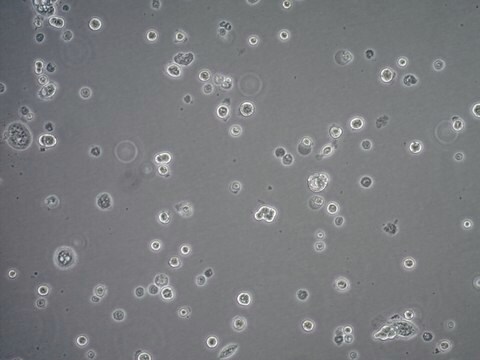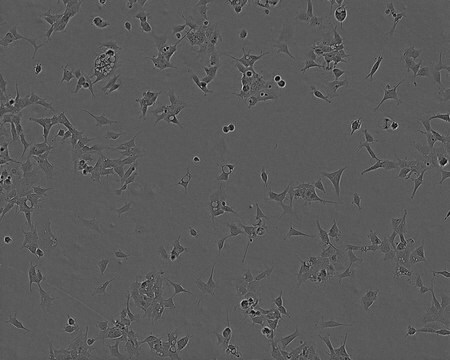SCC426
HCC827 GR6 Human Lung Adenocarcinoma Cell Line
Human
Sinónimos:
Human Lung Cell Line
Iniciar sesiónpara Ver la Fijación de precios por contrato y de la organización
About This Item
UNSPSC Code:
41106514
NACRES:
NA.81
Productos recomendados
Nombre del producto
HCC827 GR6 Human Lung Adenocarcinoma Cell Line,
biological source
human
packaging
vial of >1X10⁶ cells
manufacturer/tradename
Millipore
growth mode
N/A
technique(s)
cell culture | mammalian: suitable
shipped in
dry ice
storage temp.
−196°C
General description
Lung cancer is the most common cause of cancer-related death worldwide. The major etiological factor of lung cancer is tobacco smoke, a complex mixture of many carcinogens that play a role in the genetic and epigenetic changes occurring in the respiratory
Application
- Each vial contains >1X106 cells/vial viable cells.
- Cells are tested negative for infectious diseases by a Human Essential CLEAR panel by Charles River Animal Diagnostic Services.
- Cells are verified to be of human origin and negative for inter-species contamination from mouse, rat, Chinese hamster, Golden Syrian hamster, and Non-human Primate (NHP) as assessed by a Contamination Clear panel by Charles River Animal Diagnostic Services
- Cells are negative for mycoplasma contamination.
HCC827 GR6 human lung adenocarcinoma cell line is a model for gefitinib-resistant non-small cell lung cancer. Lung cancer is the most common cause of cancer-related death worldwide. Tobacco smoke, the main causal factor of lung cancer, is a complex mixture of many carcinogenic agents that effect genetic and epigenetic mutations in the respiratory epithelium during carcinogenesis.1Patient outcome depends on multiple factors, including the genomic signature of the tumor, and these factors help to identify patients most likely to benefit from targeted therapeutics. Patients with or EGFR (epidermal growth factor receptor, a tyrosine kinase) - activating mutations have a higher likelihood to respond to first-generation EGFR-targeted tyrosine kinase inhibitors such as erlotinib and gefitinib; however, Intrinsic or acquired resistance often limits the efficacy of targeted therapies. Resistance most often arises through secondary mutations in EGFR or amplification of the MET oncogene.2
The lung adenocarcinoma HCC827 is non-small cell lung cancer (NSCLC) cell line with an acquired E746-A750 deletion in the EGFR tyrosine kinase exon 19 domain.1 HCC827 has been used extensively in biomedical discovery and research. HCC827 GR6 is a gefitinib-resistant clone of the parental gefintinib-hypersensitive HCC827 cell line developed by six-month exposure to increasing concentrations of gefitinib in vitro.2 The resistance was shown to be a result of focal amplification of the MET proto-oncogene. Inhibition of MET signaling restores sensitivity of these cells to gefitinib. HCC827 GR6 is thus a relevant cellular model for studying resistance mechanisms for EGFR/ERBB-targeted therapeutics.
Source
HCC827 GR6 human lung adenocarcinoma cell line was derived from clonally isolated single cells of the parental HCC827 cell line. The parental cell line was isolated from non-small cell lung cancer tissue of a 39-year old female patient.1
References
1. Girard L, Zöchbauer-Müller S, Virmani AK, Gazdar AF, Minna JD. Cancer Res 2000; 60(17): 4894-4906.
2. Engelman JA et al. Science 2007; 316(5827): 1039-1043.
The lung adenocarcinoma HCC827 is non-small cell lung cancer (NSCLC) cell line with an acquired E746-A750 deletion in the EGFR tyrosine kinase exon 19 domain.1 HCC827 has been used extensively in biomedical discovery and research. HCC827 GR6 is a gefitinib-resistant clone of the parental gefintinib-hypersensitive HCC827 cell line developed by six-month exposure to increasing concentrations of gefitinib in vitro.2 The resistance was shown to be a result of focal amplification of the MET proto-oncogene. Inhibition of MET signaling restores sensitivity of these cells to gefitinib. HCC827 GR6 is thus a relevant cellular model for studying resistance mechanisms for EGFR/ERBB-targeted therapeutics.
Source
HCC827 GR6 human lung adenocarcinoma cell line was derived from clonally isolated single cells of the parental HCC827 cell line. The parental cell line was isolated from non-small cell lung cancer tissue of a 39-year old female patient.1
References
1. Girard L, Zöchbauer-Müller S, Virmani AK, Gazdar AF, Minna JD. Cancer Res 2000; 60(17): 4894-4906.
2. Engelman JA et al. Science 2007; 316(5827): 1039-1043.
Features and Benefits
HCC827 GR6 is thus a relevant cellular model for studying resistance mechanisms for EGFR/ERBB-targeted therapeutics.
Storage and Stability
Cells should be stored in liquid nitrogen until use. The cells can be cultured for at least 10 passages after initial thawing without significantly affecting the cell marker expression and functionality.
Other Notes
This product is intended for sale and sold solely to academic institutions for internal academic research use per the terms of the “Academic Use Agreement” as detailed in the product documentation.
Disclaimer
RESEARCH USE ONLY. This product is regulated in France when intended to be used for scientific purposes, including for import and export activities (Article L 1211-1 paragraph 2 of the Public Health Code). The purchaser (i.e. enduser) is required to obtain an import authorization from the France Ministry of Research referred in the Article L1245-5-1 II. of Public Health Code. By ordering this product, you are confirming that you have obtained the proper import authorization.
Unless otherwise stated in our catalog or other company documentation accompanying the product(s), our products are intended for research use only and are not to be used for any other purpose, which includes but is not limited to, unauthorized commercial uses, in vitro diagnostic uses, ex vivo or in vivo therapeutic uses or any type of consumption or application to humans or animals.
Storage Class
10 - Combustible liquids
wgk_germany
WGK 2
flash_point_f
Not applicable
flash_point_c
Not applicable
Certificados de análisis (COA)
Busque Certificados de análisis (COA) introduciendo el número de lote del producto. Los números de lote se encuentran en la etiqueta del producto después de las palabras «Lot» o «Batch»
¿Ya tiene este producto?
Encuentre la documentación para los productos que ha comprado recientemente en la Biblioteca de documentos.
Nuestro equipo de científicos tiene experiencia en todas las áreas de investigación: Ciencias de la vida, Ciencia de los materiales, Síntesis química, Cromatografía, Analítica y muchas otras.
Póngase en contacto con el Servicio técnico





